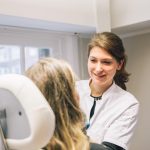Any surgery can involve complications
Complications rarely occur with upper eyelid surgery. To prepare you prior to the procedure, we think it is important that you do know about any risks. Upper eyelid surgery is a fairly simple operation, yet any surgical procedure can involve complications. You should take this into account if you are considering upper eyelid surgery. In this blog, we discuss the most common complications and how best to prevent or resolve them.
A consultation with a specialist doctor is half the battle
If you have drooping upper eyelids and are bothered by them, an upper eyelid correction may be the answer. It is wise to have the cause of your problem identified prior to surgery. In fact, droopy eyelids cannot always be solved by just removing the excess skin. To limit complications, it is wise to first consult with a specialist doctor to have an “Eyelid Analysis” performed, after which the cause of your problem can be identified and an appropriate one determined accordingly. During an analysis, we look at, among other things:
- the amount of excess skin;
- thickness and flexibility of the skin;
- The shape and position of the eye socket;
- The position of the eyebrow bone;
- The muscles around the eye socket.
Should the doctor find an upper eyelid surgery to be the right treatment for you, the excess skin above the eyes is surgically excised. The doctor makes an incision after which it is sutured exactly in the crease of your eyelid, scars are virtually invisible because of this. Your tired look and heavy feeling you were struggling with before the procedure will disappear, resulting in a fresh and rested look.
Preventing Complications
Before upper eyelid surgery, a number of steps can be taken to minimize complications. Your should get your medical history from your doctor or pharmacy, this is free of charge. You will also be asked about your medication use before the procedure. Discussing these details with the doctor in advance reduces the chance of allergies. In fact, a patient may be allergic to anesthesia, plasters, silicone or disinfectants, for example.
Risk factors
Alcohol & Smoking Drinking alcohol and smoking can cause complications sooner. Also, these factors can slow down the recovery process. Before surgery, the doctor will discuss when you should stop and when you may start again.- Blood-thinning drugs
Medications such as aspirin or anti-thrombosis drugs should not be taken before surgery; these drugs increase the risk of complications.
Common side effects
Surgery is always accompanied by side effects; with upper eyelid surgery, these are often minimal and disappear on their own:
- Bruising
The doctor makes incisions in the fold of the eyelid; this may cause bruising. The bruising can be severe for the first four days after which it slowly changes color and disappears. After two weeks, the bruises are completely gone. After surgery, we recommend immediate cooling. You can also take Arnica drops several weeks before surgery to prevent bruising. - Swelling
After upper eyelid surgery, your eyes will swell; this is perfectly normal. By taking rest, the swelling decreases on its own. - No feeling
Your upper eyelid may temporarily lack feeling. After a few weeks or months, this feeling comes back naturally.
Rare complications
- Post-bleeding
The eyelids are full of blood vessels, which is why bruising is common after upper eyelid surgery. In some cases, more blood is present than normal after surgery. If the bleeding does not want to stop, it is then wise to consult your doctor.
- Asymmetry of the eyelids
In many cases, your eyelids are already asymmetrical before surgery. Removing excess skin often makes the asymmetry stand out even more. In many cases, this recovers on its own; if not, a reoperation is sometimes necessary. - Eye drying
You may not be able to close your eyes completely after upper eyelid surgery, which can cause your eyes to dry out. The anesthetic may cause the muscles not to work immediately; this is gone after a few hours. Should too much skin have been removed, you probably won’t be able to close your eyes properly. Sometimes this can recover on its own and eye drops can help against dehydration. If this problem does not resolve itself then it must be surgically repaired. - Infection
After surgery, the goal is to reduce any pain. Should the pain become more severe, it may be due to an infection. We then recommend that you contact your doctor after which he can prescribe antibiotics, if necessary. Infections resulting in a bulging eye are very rare.
To further minimize complications, we recommend looking for a BIG registered doctor and a clinic that has good content reviews. An attractive price for eyelid surgery cannot beat a complication that could have actually been prevented. It is nota bene your face!










